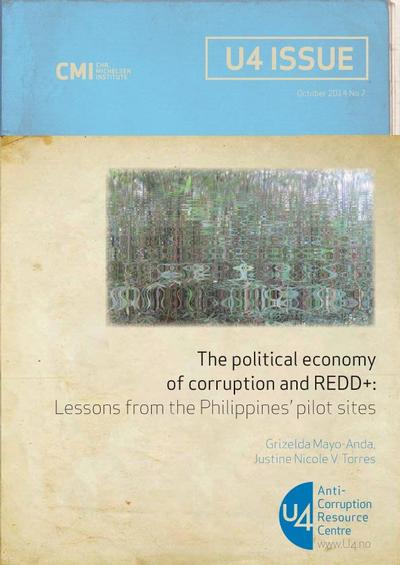Location
At U4, we work to reduce the harmful impact of corruption on society. We share research and evidence to help international development actors get sustainable results.
We have studied how corruption threatens development outcomes since 2003. Together with global research networks and practitioners, we pursue emerging topics and advance the anti-corruption field. U4 is a permanent centre at the Chr. Michelsen Institute (CMI) in Norway. CMI is a non-profit, multi-disciplinary research institute with social scientists specialising in development studies.
The U4 partners’ development agendas inspire our independent research. We apply academic rigour to explain the complex nature of corruption. We communicate practical entry-points for countering corruption – through dialogue, publications, online training, workshops, helpdesk, and innovation. Choose between a quick knowledge foundation and in-depth analysis – or have both.
Members:
Resources
Displaying 1 - 5 of 7Corruption in community-driven development. A Kenyan case study with insights from Indonesia
Community-driven development is a strategy for empowering people to choose their own priorities, project leaders, and monitoring. Many believe that this model results in lower corruption rates. We look at what happened in the Arid Lands Project in Kenya and a community-development project in Indonesia. These projects had strikingly different corruption rates, even though the countries had similar corruption perception rates at project startup. Find out which design elements may account for the differences in corruption.
Preventing corruption in community mineral beneficiation schemes
This paper analyses patterns of corruption and corruption risks related to community mineral beneficiation schemes (CMBSs) that distribute benefits funded by mineral revenues to communities. It analyses insights from existing scholarship on CMBSs, evidence from seven cases of corruption, and lessons from guidance documents on reducing corruption in the mining value chain. The aim of the paper is to stimulate debate and further research about the suitability of anti-corruption strategies for CMBSs.
Digitising the landscape: Technology to improve integrity in natural resource management
Many information technology initiatives have emerged in recent years with the aim of improving natural resource management. These take a variety of technological forms designed either to directly curb corruption in resource extraction and production, or to enhance information flows, facilitate citizen participation, and hold specific actors accountable. Donors can play a role in connecting the divide between development practitioners, technologists, and researchers by supporting the use of tools in programs and evaluations.
Corruption risks and mitigation measures in land administration
Corruption in land administration has significant societal costs, and can have a major effect on the livelihoods of people worldwide. Corruption in this sector can reduce peoples’ access to land, and harm the livelihoods of small-scale producers, agricultural labourers, indigenous communities and landless rural and urban poor. Women, young people and ethnic minorities suffer most by having their access to land hindered by corruption.
The political economy of corruption and REDD+: Lessons from the Philippines’ pilot sites
Corruption is a continuing feature of the Philippines’ natural resource sectors. Given keen interest in the country’s REDD+ potential, it is useful to consider corruption risks related to REDD+ from a political economy perspective. This U4 Issue draws on fieldwork from two REDD+ pilot sites to assess current governance and anti-corruption safeguards related to benefit-sharing, land tenure rights for indigenous peoples, and private sector involvement. Many anti-corruption actions are in place in the pilot sites, but they are weakly embedded in social relations at the local level.






